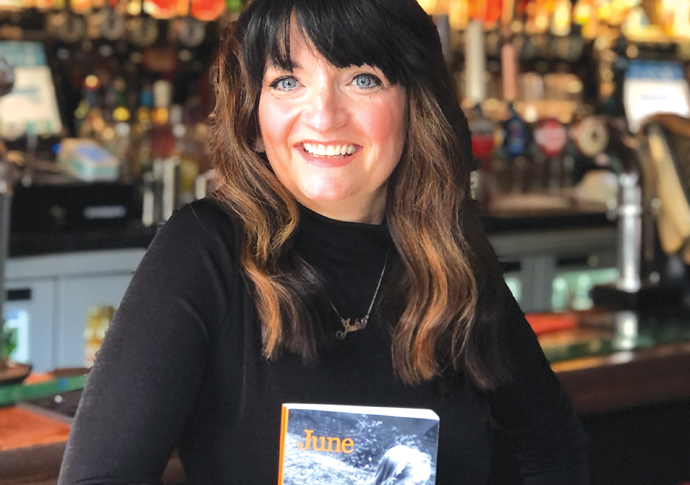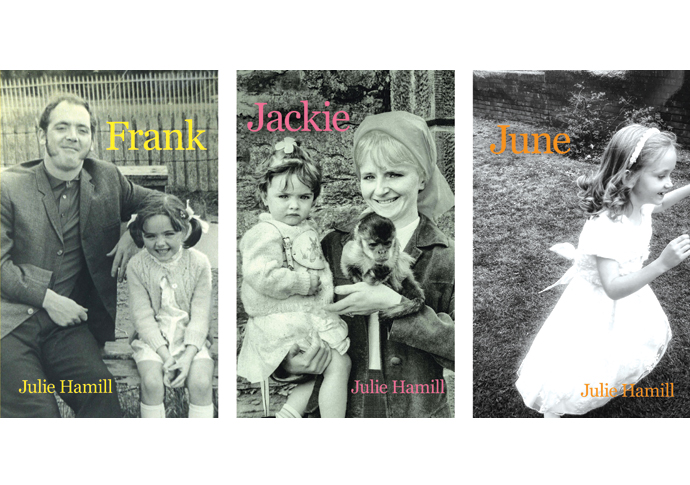Grief lives
Julie Hamill’s Life and Soul trilogy celebrates what she calls ‘the beautiful mundane’. She talks love and death with Dan Carrier
Thursday, 7th December 2023 — By Dan Carrier

Julie Hamill
WHEN a person you love dies, is that it? Or can you create a ghost-like figure patched together from memories, a comfort who can interact with you to help salve the pain of grief?
Such questions are considered in author Julie Hamill’s Life and Soul trilogy. The final instalment, titled June, is out – and it offers the reader a family story that explores the miracle and tragedy of human consciousness and that love always brings grief.
Julie, a writer and broadcaster, is also the brains behind the monthly Rock and Roll Book Club night at the Dublin Castle pub.
It was after her children were born that she took up a pen in earnest.
“I have had many careers,” says the writer, originally from Scotland, including a job in advertising that first brought her south.
“I worked for Saatchi and Saatchi in London and New York, and then I had children,” she recalls.
Becoming a mother was the catalyst to embark on an Open University course, an experience she describes as “fabulous”. Studying creative writing, it set her on the path to create the Life and Soul trilogy, stories about a family in her hometown.
The books’ genesis came from a throwaway comment made by her mother.
“She told me the story of this old man who used to go to funerals to get a free steak pie,” she says.
“It wouldn’t matter if he knew the person or not who had died – he was there for the buffet.”
The character was given a name – Frank – and that led Julie to create a fable-like narrative about grief, love, actions and reactions, and plenty more of what makes us human.
“I liked the name, Frank – it seemed to sum up an attitude, an era, for a type of man I recognised and wanted to write about. I thought about this old man, and how he must have been lonely. I asked why, and decided he must be a widower.
“I started exploring Frank – I wondered how he spent his days.
“I would walk my boy around the park in his pushchair and there were these three elderly people who met on the same bench each day.
“I would walk past and eavesdrop, I’d hear them talking about reading the gas meter, or a cat with a pigeon in its mouth. I thought these simple things are what real life is about. The normal stuff is where the beauty is.”
The final book – the first came out in 2017 – shows Julie’s subtle touch and enquiring eye for the everyday. Her books are full of recognisable passages, with perfect kitchen sink dialogue and her fly-on-the-wall observations.
“Everyone wants to talk about big issues but there are so many tiny things we overlook that are important to our existence,” she adds.

The Life and Soul trilogy
“I call it the beautiful mundane.”
We meet Frank in book one as he walks to a social club, discussing the day’s events with his wife, June.
June is dead, and Frank is confused whether he is talking to her ghost, or conjuring her up in his mind because he misses her so much.
We meet their daughter Jackie and a carousel of other characters, ranging from the no-good womaniser Tommy Fletcher to Father Cleary, who plays a role throughout, with the final episode focusing much on his life and relationship with Frank.
Writing about what you know led Julie to set the books in her hometown – and gave her an excuse to revisit the music, culture and political atmosphere of the 1980s and 1990s.
“We have a fondness for our teenage years – you realise how wonderful they were,” she states. “I wanted to remember going into Woolworths, buying a single or an LP, looking at the Pick and Mix. I wanted to walk those streets again.”
While the geographical setting speaks to her personally, so does the experience of the lead characters, who are coping with the loss of June, and the reasons behind her death. Julie has been inspired by her own approach to grief.
“I lost two people and it was so profound to be visceral,” she explains.
A way of coping was to imagine she could speak with them.
“I believed I could hear them,” she says. “My mother-in-law, Bridget, died – I still think I can hear her voice. She was so selfless. I could not deal with the fact she was not in my life. I kept her talking to me.
“Memories are important. I walked through Bridget’s house and asked her what she thought about the redecoration her son had done.”
Julie says her mother-in-law responded.
“Whether she did or not, I have kept her alive in my mind and it doesn’t matter either way.
“There doesn’t have to be a debate about this, or attempts to prove something scientifically if it brings you some comfort.”
Death and responding to mortality is a recurring theme. It doesn’t make the stories macabre, rather fills them with a sense of never-ending love.
“Many do not like mentioning death,” she says. “They say, sorry to hear about your father, and then leave the subject as they do not want to upset you.”
Julie has a refined ear for the spoken word – it is no coincidence she is a successful radio DJ – and this comes across in the believable to and fro between characters. It’s a strong point of her work. Her ear for conversation is impeccable.
“Dialogue in books can be really frustrating,” she says. “People do not think about how they speak. That can be forgotten by authors. You have to find ways to say things in a believable and automatic way.”
Above all, the author has to be an observer who can soak up a sense of person and place, and then find the words to rebuild on the page what they have experienced, she says.
“It is the simple stuff that does not seem important,” she explains.
“You have to look for it. My dad says I am always collecting – and by that he means I listen to people, collect it all up. That is where the flavour and the colour of dialogue and with it life, is to be found.”
• The trilogy Frank, Jackie and June. By Julie Hamill, Saron, £9.99